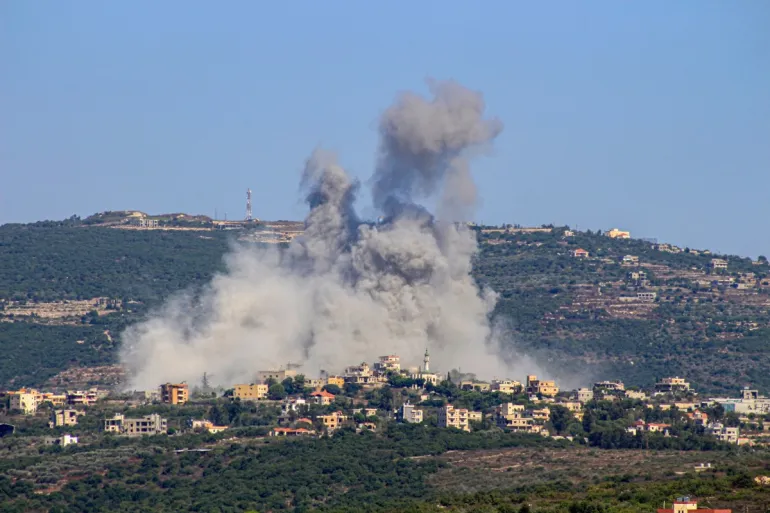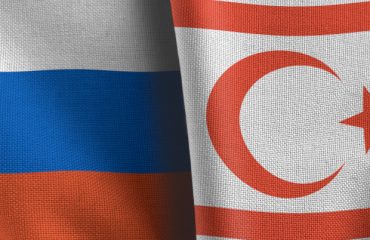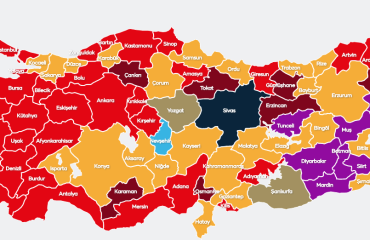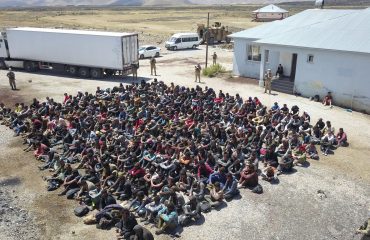

Ankara should consider launching a dual strategy: repairing relations with Israel while also reinforcing support for the Palestinian cause. How can we contribute to a secure future for Palestinians without Ankara and Tel Aviv engaging in dialogue? In the photo, Israeli airstrike in the southern Lebanese border village of Chihine.(Photo: Kawnat Haju/AFP)
As the world rapidly returns to a period defined by traditional power balances and violence, it is imperative that we strengthen ourselves across all domains, from the economy and military power to science, technology, art, culture, and the quality of human capital. To achieve this, we must urgently resolve our internal issues and focus on bolstering our vulnerabilities; we need to accurately read the changing global dynamics and actors and strategically position ourselves within the right alliances and partnerships.
Stable and prosperous neighbors
While we love rhetorical and megaphone diplomacy, this approach can only take our relationships so far. Those lacking real leverage are likely to marginalize, fragment, or be relegated to the lower tiers of the emerging global order. We must acknowledge the harsh truth: we are entering a brutal chapter of world history where hard power is in full effect.
At this critical juncture, redefining our national security interests and our place within the global system requires us to reassess our existing relationships and alliances and forge new partnerships with great powers—without either underestimating or overestimating our own strength. Above all, prioritizing stable and prosperous neighbors in our geography is essential, as their situations reflect negatively on us. Like families, countries cannot choose their neighbors; we are all prisoners of geography. However, what we can control is how we coexist and strive to create a common future. It is crucial to instill in our consciousness that we are all in the same boat. Yet, achieving this common understanding with our neighbors is far from easy due to differing perceptions, historical burdens, conflicting economic and security interests, and the challenges posed by fundamentalism, extremism, terrorism, historical animosities, authoritarian regimes, poverty, climate change, and ongoing disputes over food and energy.
The “greater Middle East”: A vision or a conspiracy?
To understand how our neighbors can impact us, it suffices to look at our own serious internal issues stemming from the fragmentation of Iraq and Syria, which are in close proximity. Similarly, it is not difficult to predict that if Iran were to splinter into its widely speculated Azerbaijani, Baluchi, Pashtun, and Kurdish regions, it would trigger unprecedented chaos and disaster in the region for decades.
Efforts to redraw the map of the region are frequently referred to as the “Greater Middle East” plan. Contrary to common belief, this is not merely a relic of the past but a systematic plan that continues to this day. I vividly recall a prominent figure from Britain, who had previously served as a senior diplomat in Ankara, telling me in London, “We evaluate Türkiye and the region not only through the prism of today but in light of potential scenarios 25 to 30 years from now.”
Whether this long-term strategy is backed by a “higher intelligence,” global masters, a Jewish conspiracy, or intelligence agencies is of little significance. However, based on my experiences in international relations through work in NATO, the OECD, the Prime Ministry, foreign affairs, multinational corporations, think tanks, and capitals like Washington, Beijing, Dubai, Berlin, and Moscow, I can confidently say that nothing develops randomly or is left to the natural flow of events.
Identifying adversaries
The region is a complete patchwork. Countries like Egypt, Jordan, Morocco, and many Gulf states are heavily dependent on U.S. support, even as China begins to expand its influence. Despite tensions with Israel, these countries maintain peace treaties with Tel Aviv. The Gulf states recently normalized their relations with Israel through the Abraham Accords, and despite conflicts in Gaza and humanitarian crises faced by the Palestinians, their commitment to these agreements remains unshaken.
In contrast, Türkiye’s support for the Palestinians has been much stronger than that of many Arab countries, even reaching a point where it undermines its own interests in relations with Israel and the West. Looking at the world map, we see that we are among the most unfortunate countries concerning our neighbors. Crises are coming in succession; as one ends, another begins.
The occupation and annexation of parts of Ukraine and Georgia, the recent occupation of significant parts of Azerbaijan by Armenia, NATO’s efforts to violate the Montreux Convention by entering the Black Sea, and the influx of migrants from Syria, Afghanistan, and Africa due to increasing terrorism represent serious threats for us. Unfortunately, hopes for better days are rapidly fading.
When considering the issues in Southeast Europe, Central Asia, and the Eastern Mediterranean or geopolitical tensions in the South China Sea, Arctic, Red Sea, and Africa, any new spark could lead to larger regional wars. Furthermore, the NATO Secretary-General has mentioned the possibility of a third world war, and the recent Washington summit declaration labeled Russia and China (along with Iran and North Korea) as adversaries.
Some countries even suggest expelling Türkiye from NATO due to its close ties with these two declared “enemy” states. We are entering a period marked by critical developments that require us to remain constantly vigilant. The waves of protectionism, sanctions, and nationalism in the global economy are reversing globalization, with economic tools and advanced artificial intelligence technology being effectively used to weaken nations. In asymmetric warfare, the winner is never clear.
Strategic neighbors
No matter which lens you view it through, our land and maritime neighbors—Russia, Ukraine, Georgia, Armenia, Azerbaijan, Iran, Syria, Iraq, Southern Cyprus, Greece, Libya, Egypt, Bulgaria, and Romania—have a profound impact on our security and prosperity. Therefore, our strategies toward these countries must be our highest priority in foreign policy, security, and economic initiatives.
Resolving conflicts with our neighbors—setting aside those that cannot be resolved for the moment—while providing them with all kinds of support without acting opportunistically in difficult times, and finding minimum common ground to establish a regional security system is becoming increasingly important. Relying solely on NATO, Russia, and China is no longer sufficient for any nation in the region.
This newly established regional order should be based on building trust across borders and must undoubtedly bring additional benefits to our entrepreneurs, provide momentum to our defense industry, and entice foreign economic actors deterred by high risks back to us. The development road project being developed with Iraq is a notable example in this context.
Rebuilding Syria
At present, we must focus on Syria, our most adversely affected neighbor. Rebuilding a fragmented, devastated, and foreign-occupied Syria, especially with a significant portion of its population having fled, is undoubtedly challenging but not impossible.
The Assad regime, which today even shies away from shaking hands with Türkiye, rightfully speaks of territorial integrity and sovereignty and demands the withdrawal of foreign forces. Yet, in reality, it controls less than 30 percent of its territory, with other regions under the control of Russians, Iranians, and Americans. Israel has not only annexed the Golan Heights but also conducts pinpoint military operations in Syria whenever it wishes. It is alarming to read that some strategists in Tel Aviv are considering opening a corridor toward oil and gas fields densely populated by Kurds near the Turkish border. Israel already has a strong presence in Iraq’s autonomous Kurdish region.
Strengthening Syria will only be possible through ensuring territorial integrity, sovereignty, control over natural resources, rebuilding the war-torn infrastructure, creating conditions for the return of displaced populations, and achieving internal political consensus with all actors, including the Kurds.
What role for China?
This will not happen overnight. Türkiye’s substantial contribution to this effort is natural, but after hosting the largest influx of Syrian refugees, it is practically impossible for it to bear this heavy burden alone. Even if Türkiye attempts to take on such a role, neither Syria, nor the Arab world, nor Russia or Iran will permit it. Israel, which desires a weakened Syria, will go to great lengths to prevent Türkiye from strengthening its position there.
The current situation benefits both Russia and the U.S.; the Gulf states could provide financial support. With little option left for the West to play a role as a “honest broker” or “game changer” after hastening the collapse of this country, a relatively neutral country with strong economic power and growing regional interests—namely, China—might be called upon to assume a leadership role in Syria. Recently, China laid the groundwork for rapprochement between Iran and Saudi Arabia and mediated among Palestinian organizations in Beijing. Perhaps, in the future, it will play a role in securing peace between Russia and Ukraine.
Balanced relations with Israel
Whether we like it or not, Israel today behaves almost like a superpower in our region, both militarily and economically. It does not hesitate to conduct covert military and intelligence operations against all countries in the region, citing national security risks. It shows no mercy and instills fear. Retaliations against Israel from countries like Iran often fail and frequently crash against a high-tech wall.
Its military capacity surpasses that of the countries in the region, and in some areas, it even exceeds ours. Thus, evaluating Israel’s strength based on a population less than half that of Istanbul can be misleading. Keep in mind that Israel has kept the 470 million Arab world on edge for years. Its arsenal is filled with F-22 Raptor fighter jets, F-35s we cannot acquire, Merkava tanks, Apache helicopters, submarines capable of launching nuclear missiles, over 400 nuclear warheads, and a robust air defense system. Who knows what other capabilities it possesses that we are unaware of?
Modernizing our defense systems and establishing a partnership that includes exemplary intelligence cooperation between MOSSAD and MIT may no longer be on the table for the foreseeable future, as Israel views Türkiye as a threat, and Ankara sees it the same way.
As a result, both countries are developing different security strategies. The failure of the chemistry between Erdoğan and Netanyahu has now spread distrust from individuals to nations, and with no reliable alternatives on the horizon, some even voice the possibility of a sudden conflict breaking out.
A pragmatic approach
If you ask me, apart from the inhumane actions in Gaza, it is unwise for Türkiye to write off Israel— with which we share many strategic interests—as an “enemy,” thus opening a new front for a country already surrounded by severe security risks, experiencing internal ethnic, social, religious, and political fractures, and grappling with a fragile economy. For Israel too, perceiving the largest and most powerful country in the region as an enemy would be a costly adventure and a significant mistake.
I believe the opportunity for dialogue has not yet been missed. Considering our history of relatively strong relations compared to other neighbors, mutual trade and investment interests, and other common benefits, constant talk of conflict, hostility, megaphone diplomacy, and even military options need not define the future of these two nations.
Ankara should consider launching a dual strategy: repairing relations with Israel while also reinforcing support for the Palestinian cause. How can we contribute to a secure future for Palestinians without Ankara and Tel Aviv engaging in dialogue?
I envision a plausible scenario in which Türkiye and Israel, along with the countries between them and the Gulf countries, can forge a robust economic and security triangle, significantly contributing to regional development and acting as a stabilizing force in a world where the U.S., China, and the EU are facing substantial challenges. This scenario, of course, not coming at the expense of the rights and freedoms of Palestinians, can be developed as a vision spanning 25 years.
It is possible for both parties to respect each other’s concerns, accurately assess their strengths, and bring this vision to fruition in the near future. If we fail to do so, I assure you that neither Türkiye, Israel, nor any other country in the region will find peace in the years to come.


